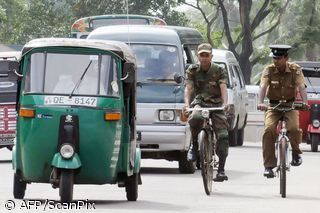When Poland and six other former communist countries entered the EU last year, many feared they would lose their most talented and skilled denizens to Britain, Ireland and Sweden
Published:
11 March 2005 y., Friday
When Poland and six other former communist countries entered the EU last year, many feared they would lose their most talented and skilled denizens to Britain, Ireland and Sweden - richer EU countries that have opened their labor markets to new EU members.
At the same time, British tabloids warned of the impending onslaught of Slovak and Hungarian Gypsies willing to work for low wages.
And France and Germany, along with most of the old EU members, imposed a seven-year waiting period on opening up their labor markets, fearing a mass migration of workers from the East would threaten jobs and bring down wages at home.
Ten months after the EU's historic expansion, very few of the fears have materialized.
Those most intent on working abroad long ago found ways to do so, while for groups such as the impoverished Gypsies, or Roma, finding jobs abroad is still too expensive and complicated.
In Poland, the feared brain drain hasn't occurred despite a jobless rate that hovers near 20 percent - the highest among the ex-communist countries that joined the EU last year.
Šaltinis:
thestaronline.com
Copying, publishing, announcing any information from the News.lt portal without written permission of News.lt editorial office is prohibited.
The most popular articles
 Campaign for green transport underscores key role of cities in fighting global warming.
more »
Campaign for green transport underscores key role of cities in fighting global warming.
more »
 The EP has called for a rapid release of EU aid funds to help victims of this summer's devastating forest fires in Southern Europe, especially in Greece.
more »
The EP has called for a rapid release of EU aid funds to help victims of this summer's devastating forest fires in Southern Europe, especially in Greece.
more »
 Taking into account changes on domestic and international money markets AB DnB NORD Bankas, a member of international financial group shall change individual and corporate time deposit rates from September 14th.
more »
Taking into account changes on domestic and international money markets AB DnB NORD Bankas, a member of international financial group shall change individual and corporate time deposit rates from September 14th.
more »
 The World Bank today approved a US$75 million IDA credit to Sri Lanka, which will support the second phase of a community driven development program that has touched the lives of nearly one million poor Sri Lankans in the three provinces of Uva, Southern, and Sabaragamuwa.
more »
The World Bank today approved a US$75 million IDA credit to Sri Lanka, which will support the second phase of a community driven development program that has touched the lives of nearly one million poor Sri Lankans in the three provinces of Uva, Southern, and Sabaragamuwa.
more »
 The lights went out on the traditional 100 watt bulb on 1 September as new EU rules on energy efficiency kicked in.
more »
The lights went out on the traditional 100 watt bulb on 1 September as new EU rules on energy efficiency kicked in.
more »
 EU seeks new tools for measuring economic performance that give more weight to social and environmental aspects of wellbeing.
more »
EU seeks new tools for measuring economic performance that give more weight to social and environmental aspects of wellbeing.
more »
 Samoa is to become the first nation in nearly 40 years to swap driving on the right side of the road, to the left.
more »
Samoa is to become the first nation in nearly 40 years to swap driving on the right side of the road, to the left.
more »
 Tales of survival are beginning to emerge among passengers plucked from a sinking ferry off the southern Philippines.
more »
Tales of survival are beginning to emerge among passengers plucked from a sinking ferry off the southern Philippines.
more »
 Taking into account changes on domestic money market AB DnB NORD Bankas, a member of international financial group shall change individual and corporate time deposit rates as of 1st September.
more »
Taking into account changes on domestic money market AB DnB NORD Bankas, a member of international financial group shall change individual and corporate time deposit rates as of 1st September.
more »
 Proposal for programme to coordinate resettlement of refugees at the EU level.
more »
Proposal for programme to coordinate resettlement of refugees at the EU level.
more »